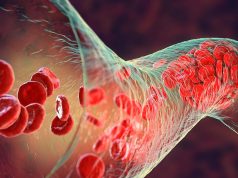Radiation Exposure From Medical Imaging Linked to Hematologic Cancer Risk in Children
10.1 percent of hematologic cancers in this cohort may have been attributable to radiation exposure from medical imaging
Aspirin Linked to Lower CRC Recurrence for Molecularly Defined Subgroup
Significantly lower incidence of colorectal cancer recurrence seen for patients with somatic alterations in PI3K pathway genes
Skin Cancer Risk Reduced for Patients Treated With Nicotinamide
Greatest effect was seen when nicotinamide was initiated after the first skin cancer
Evidence Insufficient to Determine Benefits of Multicancer Screening Tests
Sensitivity ranged from 0.095 to 0.998; specificity from 0.657 to 1.0; AUC from 0.52 to 1.0 across tests
Nonadherence to Cervical Cancer Screening Increased After COVID-19 Pandemic
Greatest increases seen among underrepresented communities including Black adults and those with lower education
Risk for Anal Cancer Elevated Among Women With History of Cervical Cancer
Anal cancer rates increased with age and over time, with highest rate among women aged 65 to 74 years
Many Clinicians Not Comfortable With Hormone Therapy in Patients With History of Gynecologic Cancer
Findings show discomfort primarily exists among gynecologists seeing patients with a history of endometrial or epithelial ovarian cancer
Rural Patients Less Likely to Have Minimally Invasive Colon Cancer Surgery
The surgical approach mediated one-third of the complication risk experienced by rural patients
hsCRP Levels Increased With Intake of High Levels of Ultraprocessed Food
Significantly increased hs-CRP seen for those consuming 40 to 59 and 60 to 79 percent ultraprocessed foods
Lung Cancer Screening Beneficial to Age 80 for Candidates Fit for Surgery
In patients treated with surgery, survival rates were comparable for those aged 75 to 80 years and for younger patients



















